UK-Spain travel news a ‘sledgehammer blow’
A ‘sledgehammer blow’ is how the Valencian tourism industry has described the UK’s decision to impose a 14-day quarantine for travellers returning from Spain. The decision was announced on Saturday and came into effect at midnight.
ALSO READ: UK advises against travelling to Spain – and imposes quarantine on return
HOSBEC, the association which represents the hospitality industry of the Valencia region, issued a statement to say that they’d had a good feeling for the next few weeks, ‘with bookings increasing and – although they were far from what would be normal for this time of year – we were hoping things would start getting back to normal towards September and October’.
Many hotels in Benidorm, where British tourists account for 40% of the total, had planned to open in the next few days, precisely because of the increase in British tourists.
HOSBEC said they would immediately start evaluating the situation, changing strategies, but that with all probability there would be changes to hotel openings, as well as flights. The association concluded, ‘We are sure that the damage to the tourism industry is going to be, yet again, very serious.’
A further blow to tourist businesses in Spain came after TUI, one of the UK’s largest tour operators, suspended flights to Spain (provisionally until 9 August), although they will bring back holidaymakers who are already abroad.
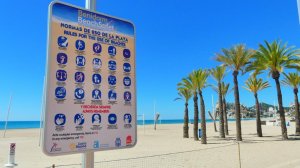
Since the announcement by the UK government, both holidaymakers and businesses alike have been left incredulous, not knowing what to do.
Holidaymakers in Benidorm and those planning to travel are unsure whether to try and return home as soon as possible – and many are unsure if their flights are still operating. Many have expressed their support on social media for the businesses which have been hit so badly by the pandemic.
One bar owner wrote that they were ‘devastated’ by the news. Like many other businesses, having seen the number of tourists gradually increasing, they had stocked up with more drinks and taken on more staff. Now it seems unlikely they will need either.
Fines of up to €60,000 for breaking Coronavirus rules
The Valencian government issued a law on Friday which includes a rising scale of fines up to €60,000 and the power to close down businesses, for those not complying with Coronavirus (Covid-19) measures.
The penalties, which are divided into three groups (light, serious and very serious), can be levied against citizens and businesses. In the case of minors, then parents or guardians will be held responsible.
The first group of penalties (light) could lead to a fine of between 60 and 600 euros and cover things such as not using a face mask or using it incorrectly. For bars it could be not reminding clients about social distancing.
At the other extreme, very serious penalties could be for organising large gatherings where hygiene measures are not observed and where minors and/or over 65s are present.
Click here to read (in Spanish) the full text and list of 15 possible infractions.
There has been a daily increase in cases of Coronavirus throughout the week in the Valencia region, with the focus of infections being among young people in bars, discos and clubs, as well as family gatherings. Just yesterday the Mya and Umbracle discos, in Valencia’s City of Arts and Sciences, were forced to close after 12 staff members tested positive for Coronavirus.
Local councils act against new outbreaks
Ana Barceló, the Valencia regional government’s councillor for health, visited one of the new Coronavirus hotspots, Gandia, last Sunday for a meeting with the mayor, Diana Morant, and the team from the public health centre.
Gandia has seen some of the strictest measures being brought in to curb the rise in cases with all bars and restaurants being shut in the town following the outbreak of Coronavirus related to areas of nightlife. By Friday the total number of positive cases in the town had risen to 114.
Barceló thanked the town council for their support with the decision because, ‘the measures have to be robust to fight the virus. We cannot stop taking these types of decisions to protect the health of all citizens’.
She said that joint responsibility between citizens and the hospitality industry was necessary, adding that the closing of pubs and discos was not something her department enjoyed doing, as the vast majority comply scrupulously with the recommendations, so her message was aimed especially at those who don’t.
On Friday Morant presented the 20 new ‘informers’ who have been recruited in Gandia to help inform people, both in town and on the beaches, about the need to comply with the recommendations and norms due to the Covid-19 situation. The workers, who are in addition to the beach helpers from the provincial government, will also give feedback to the council on how well the rules are being complied with.
Morant said: ‘Now that resurgences have arrived we are more aware than ever that this is a task for everyone.’
Gandia incorpora 20 informadors de servei per incidir en necessitat de complir amb les recomanacions i normes imposades per la situació de la Covid-19 https://t.co/pc5nupRngC pic.twitter.com/XkgWM8lCw8
— Ajuntament de Gandia (@aj_gandia) July 24, 2020
Xirivella has also seen an outbreak which quadrupled in two days from 3 to 12, leading the town council to call on the police to crack down on people not wearing face masks by issuing fines.
The council has also come up with a hard-hitting campaign aimed at getting youngsters to wear face masks: the cartoon ironically jokes that in Xirivella, not wearing a face mask has a prize: a stimulating fine of €100, a fantastic stay in hospital or a ticket ‘to a better place’ for a loved one.
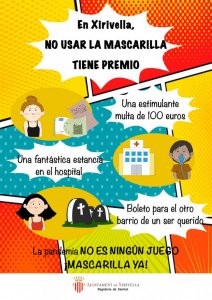
In Cullera, another town hit with new outbreaks, the town council have called on the hospitality industry to increase controls and preventative measures to avoid infections in their establishments, and said they wouldn’t hesitate to close down any that are lax in applying the rules.
Cullera mayor Jordi Mayor said, ‘We must be on guard and act rigorously to protect our venues and Cullera’s touristic image.’
Outbreaks day by day
On Monday there were 171 new cases confirmed in the Valencia region.
The outbreak in Gandia increased by 7 and the Peñiscola outbreak by 9. However, the health department called on all those who had been to the disco which was at the centre of the town’s outbreak, on the Explanada del Puerto between 11-13 July, to be tested by the health department.
Tuesday saw 79 more cases in the region with new outbreaks in Cullera, Guadassuar and Xirivella. The health department announced that 450 people had been tested in relation to the Santa Pola disco outbreak and 300 in relation to the outbreak in Peñiscola, also related to a disco.
On Wednesday there were 57 new cases with new outbreaks in Xàtiva, Santa Pola and Sant Joan d’Alacant. The four cases in Xàtiva were related to the work setting of the Xàtiva-Ontinyent hospital.
By Thursday the number of new infections was higher, at 86, with 19 in the area of Manises Hospital, two outbreaks in Valencia city, one in Rótova and another in Sagunto.
Friday saw 117 new cases registered with new outbreaks in Ribera de Cabanes, Elda, Alcora and Monforte del Cid.
Health councillor Ana Barceló said that, ‘the increase in positive cases that we’ve been seeing in the past few days is a clear call to all citizens to be prudent’, insisting that ‘we must not relax the hygiene and prevention measures against this virus’.
What are the rules with pubs and bars?
Barceló also reiterated the rules around socialising: night clubs and pubs are currently allowed a third of their normal occupancy inside – and where they have an outdoor terrace, a maximum of 75% is permitted – as long as social distancing can be maintained.
In a new move the Valencian council also wants to cut opening hours of pubs, bars and restaurants along the coast from 3am to 1.30am, unless the town council specifically requests for the limit to remain at 3am.
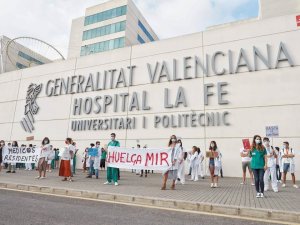
Turning applause into action
The Valencian government this week announced an investment of 120m euros in health professionals and the recognition of 43,000 degrees among interns and permanent staff.
President Ximo Puig said, ‘This is strengthening the public health system.’ He said that applauses were being transformed into action, adding that 120m euros is not just spending, it’s investment. He valued the ‘solidarity, dignity and humility’ of the health professionals during the Coronavirus pandemic and recalled ‘the debt owed by the Valencian society’.
Meanwhile junior doctors, or the MIR (Médicos Internos Residentes), have been on strike since Tuesday calling for improvements in their working conditions.
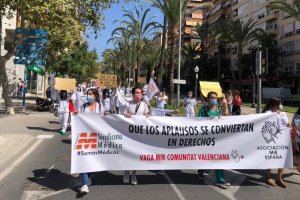
This group of health professionals, who have played a major role during the Coronavirus crisis, claim that they are being exploited and that without them the health system could collapse.
They are asking for an end to an uninterrupted 24-hour working day, an increase in health staff, an increase in pay and greater supervision of their work.
On Wednesday they had a first informal meeting with the health councillor, Ana Barceló, although nothing tangible has yet been agreed. Members of MIR wrote on Facebook that the fact they were called for negotiations so soon was a good sign.
On Thursday, the third day of the strike, more than 1,000 junior doctors took to the streets of Valencia dressed in their white coats, in a socially distanced and face-masked march.
Posters carried messages like, ‘We’re trainee doctors, not cheap labour’ – ‘I’ve been working for 24 hours, should I attend you?’ – and ‘Without rights we’ll stop the hospitals’.
Covid-positive tourists
Amid the confusion and questions regarding the hotel industry and the concern about what happens if a guest tests positive while at an establishment, the government has produced a special guide for those offering any type of touristic accommodation in the Valencia region, including those offering B&B or apartments. You can click here for the full guide (in Spanish).
The guide states that if a guest receives a Covid-19 positive test during their stay, any extra days will be paid for by the guest themselves, if it’s not covered by travel insurance. The guide also states that establishments must inform guests of this when they check in.
There is also another possibility set out in the guide, that Coronavirus-positive patients and their companions could be placed in a separate area, even a separate floor. The guide also sets out clearly the protocols that establishments must follow regarding hygiene, maintenance and food.
On Friday, tourism councillor Francesc Colomer announced that 100 hotel rooms were to be made available for those tourists without travel insurance, the cost being covered by the government.
The tourism department said they would be establishing two ‘hoteles refugios’ where Coronavirus-positive visitors could be isolated. One would be in Alicante and the other in Valencia (this would also cover the Castellón province) and they would be chosen according to their proximity to large numbers of tourists and a referral hospital.
The contract would be worth a maximum of €180,000 for the hotel and Colomer explained that the idea was to find hotels which have so far not re-opened.
Beach availability
If you’re planning a day at the beach and want to avoid disappointment, check out this government website which shows all the beaches along the Valencian coast. There are live updates showing how full the beaches are and some are connected to webcams.
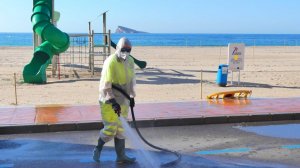
Benidorm beach updates
From Friday any reserved beach plots not taken up within a certain time will become available again on the system. Benidorm’s famous Levante beach, which has been using the online reservation system since 17 July [see last week’s report] had seen up to 30% of the plots sitting empty. In order to free up more beach space, any ‘morning’ or ‘whole day’ plots must be occupied by 11h and any afternoon plots by 17.30h.
The system has also changed the timetable for reservations. Previously reservations could be made from 12 noon for the following day. This has now changed to 9am with some users reporting all plots taken by 10am.
Poniente Beach continues to operate as before, with access points and staff on-hand to answer questions and control capacity.
Jazz in Peñiscola
The American saxophonist, Scott Hamilton, played at the opening night of the 17th Peñiscola International Jazz Festival on Friday evening. Before Hamilton, the Jove Dixieland Band played a selection of New Orleans-style jazz.
The event, which boasts two more concerts than last year’s festival, is being held at the Palau de Congressos. It continues this evening with the David Pastor Quartet and on Monday the Sevillian pianist Dorantes.
On Wednesday Patàx will perform their new generation Spanish jazz and the festival will close on Saturday with a performance by the Castellon perfomer, Bárbara Breve.
Click here for full details of the programme.
Hard-hitting viral video
A hard-hitting video made by the Canary Islands government has been doing the rounds on social media throughout the country – including in Valencia.
We had planned a family gathering for today to celebrate my sister and mother-in-laws’ saint’s day, Santa Ana, but after much discussion of how we could all meet up at an outdoor location, each family taking their own food, not getting too close, wearing face masks, the consensus was that it just wasn’t worth the risk. So, Felicidades to all the Anas! And maybe next year!
Join us!
If you’d like to join us on Valencia in English, we’re currently looking for someone with online media sales and marketing experience, to sell traditional advertising and branded content, with a good grasp of social media and content marketing – preferably with a good enough knowledge of the Valencia region. The role could be part-time, freelance or full-time. If you speak some English, even better – but it doesn’t have to be fluent or native level. Email us at: admin@spainenglish.com
Sign up for the FREE Weekly Newsletter from Spain in English
Please support Spain in English with a donation.
Click here to get your business activity or services listed on our DIRECTORY
ALSO READ: Valencia in English (19 July)
ALSO READ: Valencia in English (12 July)
ALSO READ: Valencia in English (5 July)
ALSO READ: Valencia in English (28 June)
ALSO READ: Valencia in English (21 June)
ALSO READ: Valencia in English (14 June)
ALSO READ: Valencia in English (7 June)
ALSO READ: Valencia in English (31 May)
ALSO READ: Valencia in English (24 May)
ALSO READ: Valencia in English (17 May)
ALSO READ: Welcome to ‘Valencia in English’

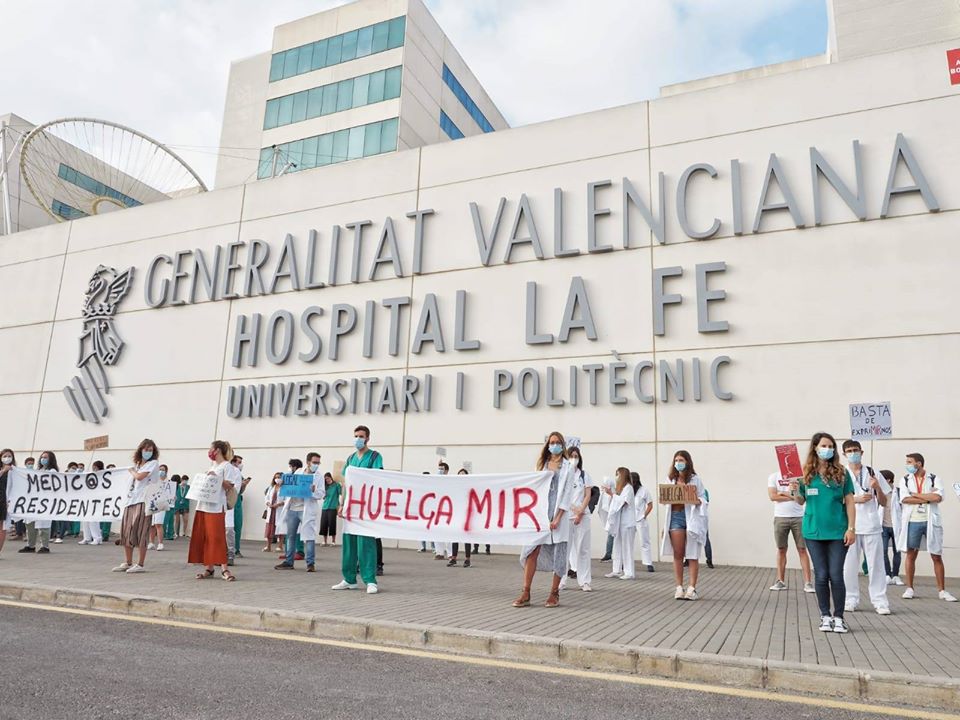

2 comments
Spain isn’t dangerous, not keeping distance is. Bars, discothekes and restaurants lack of visitor identification to follow up infections, and rules must be mandatory for everybody without exceptions.
It is very hard to impose these measures. Some people show a total lack of respect and are taking measures such as wearing a mask as a joke.
I live across the street from 2 bars and there is no social distancing whatsoever. What’s more, they share glasses, cigarettes and go about hugging one another. On Thursday evening, one young woman sitting at a bar on Peru street in Gandìa, with a group of 5 others even ripped off a friend’s mask as the young man approached them. She went on to make fun of him and smear her hand in his face, causing all in her group to roar with laughter.
Are these the people the authorities expect to be responsible?
Wishful thinking, I’m afraid